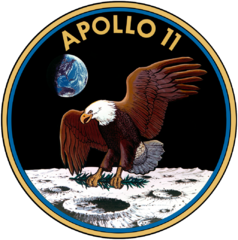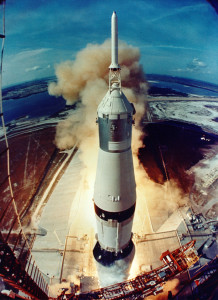Human Interest
Apollo 11: the launch

Exactly 45 years ago at the time of posting (Wednesday July 16, 1969, 13:32 UTC), Apollo 11 blasted off for the moon. At least one gaming developer rates this as a wonder of the world. One can rightly wonder whether America, or anyone in the world, can ever do this kind of project again. Today begins a day-by-day look back at that historic mission.
Background of Apollo 11
The notion of men flying to the moon began in the second half of the nineteenth century. Jules Verne famously envisioned it, as did Herbert George Wells. Both men acknowledged the obvious:
- A flight to the moon would need new technologies.
- Such a flight would be the perfect way to demonstrate those technologies.
Both have proved true, of course. Miniature (for the time) computers got Apollo 11 off the pad. Today one sees computers everywhere. A modern desktop could run Apollo 11 easily, including launch, the “injections” (flight from one celestial body to another), the “insertions,” landing (and taking off again), and recovery.
But the idea of landing on the moon struck many as extremely dangerous. Remember: conventional wisdom held the moon, and the earth, were both 4.6 billion years old. The moon collects a lot of dust. That much dust, planners feared, might swallow any landing craft, as quicksand swallows the unwary in a swamp. (See here for some calculations.)
Nevertheless, at least one politician famously decided the risk was worth taking:
I believe this nation should commit itself to achieving the goal, before this decade is out, of landing a man on the moon and returning him safely to the earth.
John F. Kennedy, 35th President of the United States
More than eight years would pass before three men (Neil Armstrong, Edwin “Buzz” Aldrin, and Michael Collins) would make Kennedy’s vision real.
Apollo 11 goes up

Apollo 11 lifts off Pad 39A, John F. Kennedy Space Center, on 16 July 1969 at 9:32 a.m. local time. Photo: NASA
NASA keeps this file, “Apollo By the Numbers,” on its own site. This page gives specific times, angles, and other interesting numbers for Apollo 11.
Apollo 11 took off promptly at 13:32:00 hours Greenwich Meridian Time (GMT), now renamed Coordinated Universal Time (UTC). That translates to 9:32:00 a.m. Eastern Daylight Time, the local time at the Kennedy Space Center.
Apollo 11 reached parking orbit in under twelve minutes. Apollo 11 circled the earth about 100 miles high, and once in about 88 minutes.
After one and a half orbits, Apollo 11 fired its Saturn V third-stage engine for the last time. This burn sent the craft on its trans-lunar injection, to throw it out of earth’s orbit and toward the moon.
The astronauts had a busy day. Only half an hour after this burn, they separated from the third stage and turned their ship around. They then came back to dock with the most important and most delicate machine they carried: the Lunar Module, a two-stage spacecraft that would make the actual landing. After that, the massive third stage squirted out the last of its fuel (not a burn) and sailed beyond the moon. That stage circles the sun to this day. But one of the four panels that held the LM in place during liftoff kept up with the combined Command-Service-Lunar Module spacecraft all the way to the moon. That started a legend that an extraterrestrial scoutcraft shadowed Apollo 11 during its mission.
The tiny spacecraft, much smaller than the big rocket that lofted it into space, would take three days to coast to the moon.
[subscribe2]
Terry A. Hurlbut has been a student of politics, philosophy, and science for more than 35 years. He is a graduate of Yale College and has served as a physician-level laboratory administrator in a 250-bed community hospital. He also is a serious student of the Bible, is conversant in its two primary original languages, and has followed the creation-science movement closely since 1993.
-

 Civilization2 days ago
Civilization2 days agoWhy Europe Shouldn’t Be Upset at Trump’s Venezuelan Actions
-

 Accountability5 days ago
Accountability5 days agoWaste of the Day: Principal Bought Lobster with School Funds
-

 Executive3 days ago
Executive3 days agoHow Relaxed COVID-Era Rules Fueled Minnesota’s Biggest Scam
-

 Constitution4 days ago
Constitution4 days agoTrump, Canada, and the Constitutional Problem Beneath the Bridge
-

 Christianity Today2 days ago
Christianity Today2 days agoSurprising Revival: Gen Z Men & Highly Educated Lead Return to Religion
-

 Civilization3 days ago
Civilization3 days agoThe End of Purple States and Competitive Districts
-

 Executive3 days ago
Executive3 days agoWaste of the Day: Can You Hear Me Now?
-

 Executive4 days ago
Executive4 days agoWaste of the Day: States Spent Welfare in “Crazy Ways”











[…] Apollo 11: the launch […]
Peter Egan liked this on Facebook.
[…] Apollo 11: the launch […]
[…] Apollo 11: the launch […]
[…] 11 was a modern “wonder of the world.” CNAV explored this five years ago; see here, here and here. One can only hope that the first series of missions to another world will not be […]